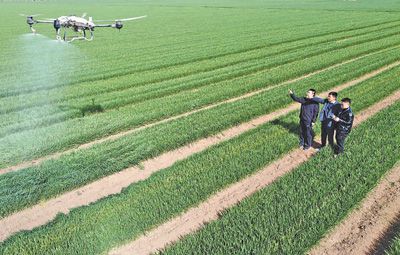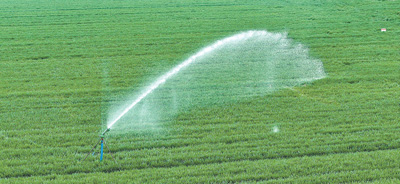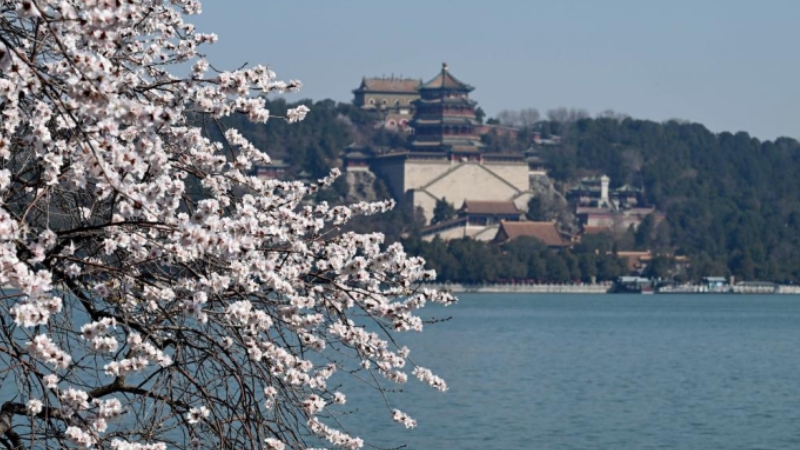Technology facilitates efficient spring farming in C China's Henan
After breakfast, Ning Yong, a villager from Zhangwulou village in Wangmingkou township, Xiangcheng city in central China's Henan Province headed to his wheat fields and contacted the township's aerial spraying service team, asking the latter to send drones to spray herbicides, insecticides, and fungicides, and plant growth regulators on his wheat.
Ning, a major grain grower in the village, cultivates 650 mu (43.33 hectares) of farmland. Previously, he would hire over 10 workers to help irrigate his fields through flood irrigation and it took half a month to finish irrigating the fields.

Ning Yong (center) and other farmers operate a drone to spray pesticides, fungicides, and fertilizers on wheat on March 19, 2024. (Photo/Wang Fuqiang)
"In those days, we didn't manage the fields well, resulting in low wheat yields. The best yield was only 500 kilograms per mu," Ning said.
In 2022, the township secured project funding to develop 15,400 mu of high-standard farmland. This involved constructing roads, drilling wells, digging ditches and channels, and laying pipelines.
Ning's 650 mu of land were transformed into high-standard farmland.
"The fields are equipped with sprinkler irrigation systems, which can be operated with a simple press of a button or swipe of a card," Ning said, while taking out a remote control from his pocket.
When he aimed the remote control at the well house, located several tens of meters away, the sprinkler irrigation system in the wheat field instantly turned on.

An automatic sprinkler irrigates wheat in Zhangwulou village, Wangmingkou township, Xiangcheng city in central China's Henan Province, on March 19, 2024. (Photo/Wang Fuqiang)
"Switching from flood irrigation to regular and controlled watering not only saves water but also effectively regulates soil moisture for optimal crop growth," explained Ning.
In recent years, Ning has invested in over 10 agricultural machines, streamlining the processes of plowing, planting, and harvesting.
The local agricultural technicians regularly visit the fields to provide guidance.
"They teach us the proper timing for watering, the appropriate use of pesticides, and the correct fertilization methods, guiding us in adopting scientific farming practices," said Ning.
"Thanks to the implementation of agricultural technologies, the wheat seedlings have thrived, resulting in yields of over 600 kilograms per mu. As a result, I can generate an annual net income ranging from 500,000 to 600,000 yuan ($69,000 to $83,000) from my fields," he said.
In less than half an hour, the aerial spraying service team arrived at the fields. "They can help finish spraying herbicides, insecticides, and fungicides, and plant growth regulators across the entire 650 mu of wheat before night," said Ning.
The 85 million mu of wheat in Henan has started to green up, and spring farmland management is underway. To provide effective support, the Henan Academy of Agricultural Sciences has initiated an agricultural technology service, which includes the establishment of 69 agricultural technology service teams.
More than 1,000 agricultural technicians are sent to the fields to evaluate seedling conditions, monitor soil moisture levels, implement pest and disease control measures, and prepare for potential extreme weather conditions.
Photos
Related Stories
- AI-powered smart farming system improves production efficiency in Anhui
- Spring farming underway across China
- Farmers create vibrant scenes of spring farming in SW China's Sichuan
- Spring farming is underway in south China's Guangxi
- Fertilizer transportation in full swing for spring farming in Heilongjiang
- Chinese vice premier stresses preparation for spring farming
Copyright © 2024 People's Daily Online. All Rights Reserved.









